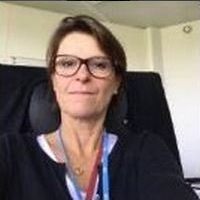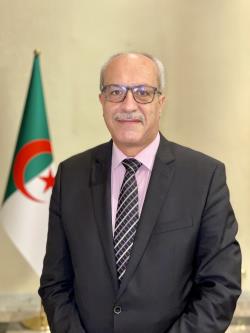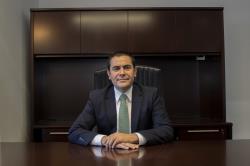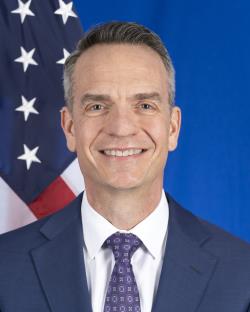Leaders TalkX: When Policy Meets Progress: Shaping a Fit for Future Digital World
WSIS
Session 497
"An enabling environment at national and international levels is essential for the Information Society. ICTs should be used as an important tool for good governance.
The rule of law, accompanied by a supportive, transparent, pro-competitive, technologically neutral and predictable policy and regulatory framework reflecting national realities, is essential for building a people-centered Information Society. Governments should intervene, as appropriate, to correct market failures, to maintain fair competition, to attract investment, to enhance the development of the ICT infrastructure and applications, to maximize economic and social benefits, and to serve national priorities.
ICTs are an important enabler of growth through efficiency gains and increased productivity, in particular by small and medium sized enterprises (SMEs). In this regard, the development of the Information Society is important for broadly-based economic growth in both developed and developing economies. ICT-supported productivity gains and applied innovations across economic sectors should be fostered. Equitable distribution of the benefits contributes to poverty eradication and social development. Policies that foster productive investment and enable firms, notably SMEs, to make the changes needed to seize the benefits from ICTs, are likely to be the most beneficial."
Geneva Declaration of Principles, WSIS 2003, https://www.itu.int/net/wsis/docs/geneva/official/dop.html

As part of the Digital Economy policy team at the International Chamber of Commerce (ICC), Timea Suto works with global business experts to bring private sector views into activities and decisions of ICC’s Business Action to Support the Information Society (BASIS) initiative. Among her different responsibilities, she leads policy input and project work on the Internet governance forum and enhanced cooperation, having served on the United Nations Commission on Science and Technology for Development Working Group on Enhanced Cooperation (2016-2018).
ICC is the largest, most-representative global business organization and only private sector body to have official Observer status to the United Nations General Assembly. During the World Summit on the Information Society (WSIS), ICC convened and facilitated business input and through ICC BASIS, it has continued to bring input and support engagement from business into the post-WSIS activities, whether at the UN and its various agencies or via multistakeholder activities such as the Internet governance forum (IGF).
Ms Suto has a degree in International Relations and masters degrees in Minority Policy and European Public Policy. She speaks fluent Hungarian, Romanian, English and French.

Sofie Maddens is the Head of the Regulatory and Market Environment Division of the ITU BDT. Lawyer by training, Sofie Maddens has worked as Regulatory and Policy Expert in the telecommunications/ICT sector in international and multi-cultural environments, including in Asia and the Middle East, as well as in the Americas, Europe and Africa. She has managed complex private sector, government, and regional and international projects and grants for national governments and their National Regulatory Authorities, the European Commission, the World Bank, the Telecommunications Development Bureau of the ITU as well as for a wide variety of private telecommunications, consulting and financial sector clients. Her scope of expertise has focused in particular on the information and communications sectors, the postal sector as well as the information society (including Internet policy and governance, e-commerce, privacy, cybercrime and cyber security).

Karim Bibi Triki is the Minister of Post and Telecommunications of Algeria since July 2021. Before, he was the CEO of Group Telecom Algerie, main Telecom Group in Algeria. Previously, he worked for Intel Corporation from 2009 to 2020 and held many responsibilities including Country Manager at Intel responsible for Egypt, Levant and North Africa countries.
Before joining Intel, Karim started his career in 1992 at Alfatron Electronic Industries (OEM) as System Architect responsible for the design of motherboards and computer systems, then Director of Engineering & Development, and President & CEO for the last 9 years at Alfatron.
.jpg?maxwidth=250)
Philip Marnick is the General Director of the Telecommunications Regulatory Authority (TRA). He was appointed early January 2022 by the Members of the Board, to assume the position, paving the way for a more effective regulatory framework by continuing the evolution of the telecom sector liberalization.
Mr. Marnick leads the TRA, including the development of consumer protection initiatives and resolving disputes. The TRA develops regulatory rules that promote competition, innovation, and investment in broadband services and facilities, as well as developing a more comprehensive and competitive framework that aligns with international best practices. Ensuring that Bahrain remains a center of innovation and that its telecommunications sector serves everyone while supporting Bahrain’s strategic objectives.
Mr. Marnick has worked in the telecommunications sector for over 30 years. From analogue to 5G, he has engaged across every mobile generation. Throughout his carrier he has been at the forefront of industry developments – in both fixed and mobile. He has collaborated on the first deployments of mobile networks utilizing new technologies and standards, this has also included innovative products such as the first camera phone and photo messaging service, as well as mobile internet and hosted voice services.

Ms. Ekaterine Imedadze has been a commissioner of the Georgian National Communications Commission (ComCom) since March 2021. Prior to taking up her position, she headed the Telecommunications Market Regulation Department at ComCom.
Ms. Imedadze has over 15 years of professional experience in telecommunications with a global perspective. Ekaterine has held several key positions at the international telecommunications group company VEON Ltd., leading the Global Process unit responsible for the group's digital transformation. She also served as the group's internal control and risk management lead for several years. Ms. Imedadze had previously served as the Head of Finance and Operations for a number of large private organisations, as well as a business consultant for leading ICT companies.
Ms. Imedadze holds an MBA from the University of Bradford School of Management and completed the Innovation Leadership programme at the Massachusetts Institute of Technology (MIT). Previously, she earned a master's degree in physics as well as a postgraduate diploma in artificial intelligence and fuzzy logic from Tbilisi State University, and she is currently pursuing an LL.M. in competition law and economics at the Brussels School of Competition (BSC).
She speaks Georgian, English, German and Russian.

Javier Juárez Mojica has been Commissioner of the Federal Telecommunications Institute (IFT) since October 2016 and acting chairman since March 2022. He is an honorary member of the Commission on Ethics in Scientific Knowledge and Technology (COMEST) of the United Nations Educational, Scientific and Cultural Organization (UNESCO), has been member of the OECD Expert Group on Artificial Intelligence (AIGO), former Vice-chair of the Working Party on Communication Infrastructures and Services Policy (CISP) at the OECD (2019-2021), former president of the Technical Committee on 5G networks deployment in Mexico, and currently serves as chair of the Small Operators Committee.
Commissioner Juárez has devoted a professional career of more than 15 years to the study of telecommunications and to the promotion of innovation and competition in this sector. He has participated in conferences and lectures on interconnection, community and indigenous networks, local loop unbundling, virtual mobile operators, Internet of Things, Artificial Intelligence (A.I.), cybersecurity, and digital transformation, among others.
Author of the books Mi Neighbor is a Robot (Penguin Random House 2022) and The Future of Computing in Mexico: Proposals from the Mexican Academy of Computing (2018), as well as of several articles and book chapters on telecommunications regulation (2007) and the challenges of living with A.I.

Steve Lang has been the Deputy Assistant Secretary for International Information and Communications Policy since November 2022. Previously he served as the Minister-Counselor for Economic Affairs at U.S. Embassy Tokyo (2020-2022) and in the Bureau of Economic and Business Affairs’ Office of International Communication and Information Policy as Director of both the Office of Multilateral Affairs (2017-2018) and the Office of Bilateral and Regional Affairs (2015-2017). From 2013 to 2015, Steve was the Political Counselor at the U.S. Embassy in Mexico City.
Previously, he served as Deputy Director of the Office of Chinese and Mongolian Affairs at the Department of State (2011-2013) and as a Senior Analyst in the U.S. Trade Representative’s Office of Japan, Korea, and APEC Affairs (2010-2011). Prior tours include the U.S. Consulate-General in Guangzhou, China; the American Institute in Taiwan in Taipei; the Bureau of Western Hemisphere Affairs; the U.S. Embassy in Bangkok; and the U.S. Interests Section in Havana, Cuba. Before joining the State Department, Steve worked as an economist for the Department of Labor and is a graduate of Georgetown University

Ms. Bernadette Lewis was appointed Secretary-General of the Commonwealth Telecommunications Organisation in August 2020. This was a historic appointment as she is the first female Secretary General in the 122-year history of the CTO.
Breaking the glass ceiling is not new to Ms. Lewis; she was also the first female Secretary-General of the Caribbean Telecommunications Union (CTU) since 2003 and is credited for making the CTU the foremost information and communication technology (ICT) inter-governmental institution in the Caribbean.
Ms. Lewis has a wealth of experience and knowledgeable in national and international ICT issues, having also worked in senior positions at the Caribbean Association of National Telecommunications Organisations (CANTO) and Telecommunications Services of Trinidad and Tobago when significant technological changes and convergence were transforming the industry.
Ms. Lewis is passionate about ensuring that the Commonwealth citizens and beyond have affordable access also benefit from effective use of ICT.
-
 C2. Information and communication infrastructure
C2. Information and communication infrastructure
-
 C3. Access to information and knowledge
C3. Access to information and knowledge
-
 C5. Building confidence and security in use of ICTs
C5. Building confidence and security in use of ICTs
-
 Goal 1: End poverty in all its forms everywhere
Goal 1: End poverty in all its forms everywhere
-
 Goal 2: End hunger, achieve food security and improved nutrition and promote sustainable agriculture
Goal 2: End hunger, achieve food security and improved nutrition and promote sustainable agriculture
-
 Goal 3: Ensure healthy lives and promote well-being for all
Goal 3: Ensure healthy lives and promote well-being for all
-
 Goal 4: Ensure inclusive and equitable quality education and promote lifelong learning opportunities for all
Goal 4: Ensure inclusive and equitable quality education and promote lifelong learning opportunities for all
-
 Goal 5: Achieve gender equality and empower all women and girls
Goal 5: Achieve gender equality and empower all women and girls
-
 Goal 6: Ensure access to water and sanitation for all
Goal 6: Ensure access to water and sanitation for all
-
 Goal 7: Ensure access to affordable, reliable, sustainable and modern energy for all
Goal 7: Ensure access to affordable, reliable, sustainable and modern energy for all
-
 Goal 8: Promote inclusive and sustainable economic growth, employment and decent work for all
Goal 8: Promote inclusive and sustainable economic growth, employment and decent work for all
-
 Goal 9: Build resilient infrastructure, promote sustainable industrialization and foster innovation
Goal 9: Build resilient infrastructure, promote sustainable industrialization and foster innovation
-
 Goal 10: Reduce inequality within and among countries
Goal 10: Reduce inequality within and among countries
-
 Goal 11: Make cities inclusive, safe, resilient and sustainable
Goal 11: Make cities inclusive, safe, resilient and sustainable
-
 Goal 12: Ensure sustainable consumption and production patterns
Goal 12: Ensure sustainable consumption and production patterns
-
 Goal 13: Take urgent action to combat climate change and its impacts
Goal 13: Take urgent action to combat climate change and its impacts
-
 Goal 14: Conserve and sustainably use the oceans, seas and marine resources
Goal 14: Conserve and sustainably use the oceans, seas and marine resources
-
 Goal 15: Sustainably manage forests, combat desertification, halt and reverse land degradation, halt biodiversity loss
Goal 15: Sustainably manage forests, combat desertification, halt and reverse land degradation, halt biodiversity loss
-
 Goal 16: Promote just, peaceful and inclusive societies
Goal 16: Promote just, peaceful and inclusive societies
-
 Goal 17: Revitalize the global partnership for sustainable development
Goal 17: Revitalize the global partnership for sustainable development